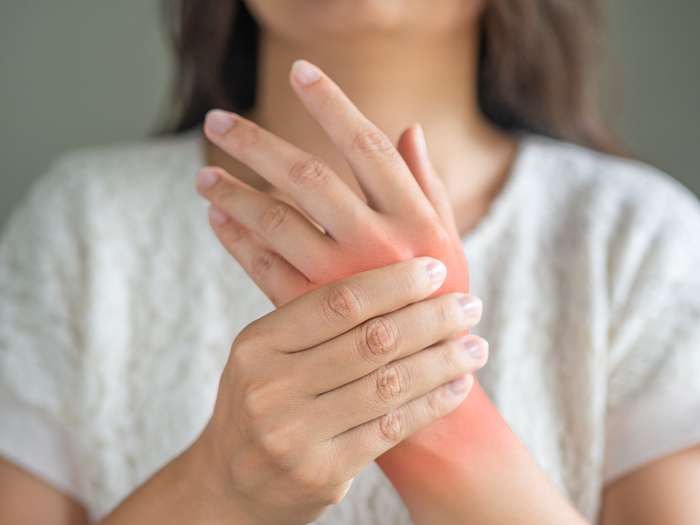Rheumatoid Arthritis Treatment in MRC Nagar, Chennai
Rheumatoid arthritis is a chronic autoimmune disorder. Rheumatoid arthritis occurs when the immune system starts attacking its own body tissues by mistake. It can affect various body parts like eyes, skin, heart, lungs, blood vessels, but most importantly joints.
Rheumatoid arthritis attacks the lining of the joints, causing joint deformity and bone erosion. You can search and visit an ortho hospital near me or an orthopedic surgeon near me.

What are the symptoms of rheumatoid arthritis?
Symptoms include:
- Tender and swollen joints
- Stiffness in joints
- Loss of appetite
- Fever
- Joint deformation
Rheumatoid arthritis affects the smaller joints at first, like the joints in the fingers and toes, proceeding further to the wrists, elbows, knees, ankles, shoulders and hips. If the disease remains untreated, it may affect skin, nerve tissue, blood vessels, eyes, lungs, heart, salivary glands and other body parts. In case you have the symptoms, you must search and visit the best ortho doctor near me.
What causes rheumatoid arthritis?
In normal condition, our immune system protects us from infections and diseases. In autoimmune disorders like rheumatoid arthritis, the immune system attacks the body's own healthy tissues of the joints. This may further proceed with other medical conditions involving various other body parts.
Even after huge advancements in the medical field, the exact cause of rheumatoid arthritis remains unknown. However, it has been said that genetic components play a major role in the progression of the disease.
When do you need to see a doctor?
You must visit a doctor if you have persistent swelling, pain or discomfort in joints. One may visit rheumatologists or orthopedists.
Request an appointment at Apollo Spectra Hospitals, MRC Nagar, Chennai.
Call 1860 500 2244 to book an appointment.
What are the risk factors?
Certain factors may increase the risk of rheumatoid arthritis such as:
- Gender (women is said to be more susceptible to rheumatoid arthritis)
- Age
- Genetics or family history
- Excessive weight or obesity
- Smoking
What are the complications?
- Rheumatoid nodules
- Dry eyes and mouth
- Abnormal body compositions
- Heart issues
- Lung issues
- Various infections
- Osteoporosis
- Lymphoma
- Carpal tunnel syndrome
How is rheumatoid arthritis diagnosed?
Doctors start with physical examination of the joints for inflammation, swelling and redness, along with muscle and strength tests. Furthermore, your doctor may proceed with a blood test to check for C-reactive protein (CRP) level and erythrocyte sedimentation rate that indicates presence of inflammation in the body, followed by rheumatoid factor and anti-CCP antibodies. X-rays, magnetic resonance imaging and ultrasound tests are also done.
What is the treatment for rheumatoid arthritis?
- Medications: Depending upon the severity of the disease and joint location, an orthopedic doctor suggests medications such as:
- Steroids
- Biologic agents
- DMARDs (conventional and targeted synthetics)
- Nonsteroidal anti-inflammatory drugs
- Therapy: Physical therapy helps in keeping flexibility in the joints. An orthopedic doctor sometimes refers patients to an occupational or physical therapist for therapy.
- Surgery: If medications fail to slow down or prevent damage to joint, orthopedic doctor may refer you for surgeries like:
- Tendon repair: Joint damage may cause the tendons around the joints to rupture or loosen. Through this surgical procedure, tendons can be repaired.
- Arthroscopy (total joint replacement): In this case, a prosthesis, made by metal and plastic, is inserted in the body to replace the damaged body part.
- Joint fusion: A surgeon uses plates, pins, rods and screws to join the bones in order to make one joint. This helps in stabilizing and realigning the joint and helps in pain relief.
- Synovectomy: During this procedure, the inflamed lining of the synovium (joint) is removed. This can improve joint flexibility and help in minimizing the pain.
Surgery does pose risk of infection, pain and bleeding. You should always discuss the risks and benefits prior to opting for the treatment procedure.
Symptoms
Treatments
Our Top Specialities
NOTICE BOARD
CONTACT US
CONTACT US
 Book Appointment
Book Appointment


.svg)
.svg)
.svg)
.svg)








